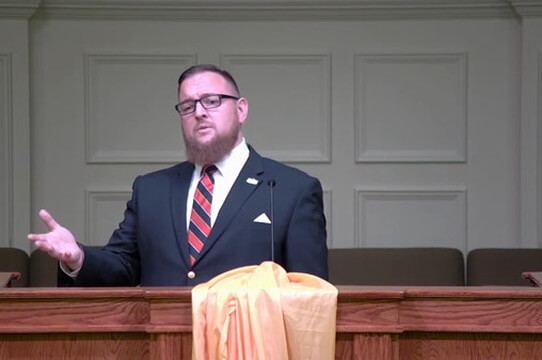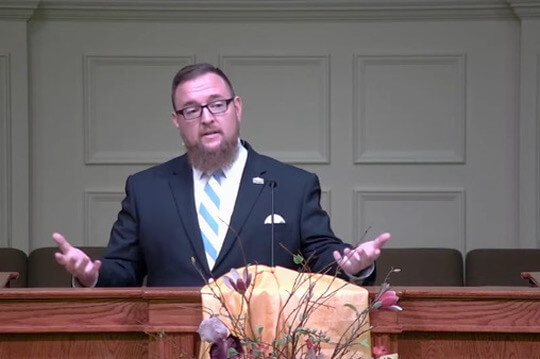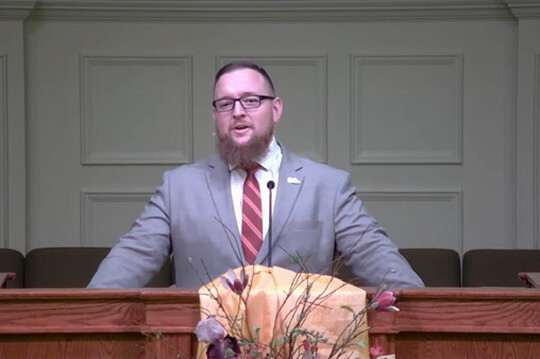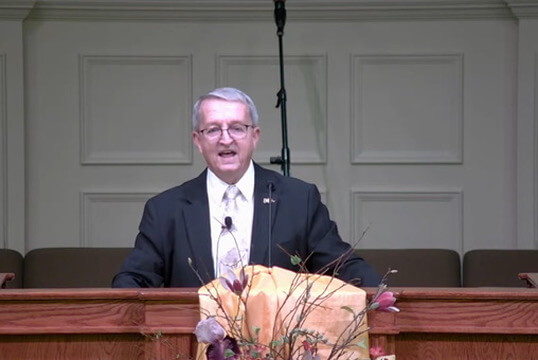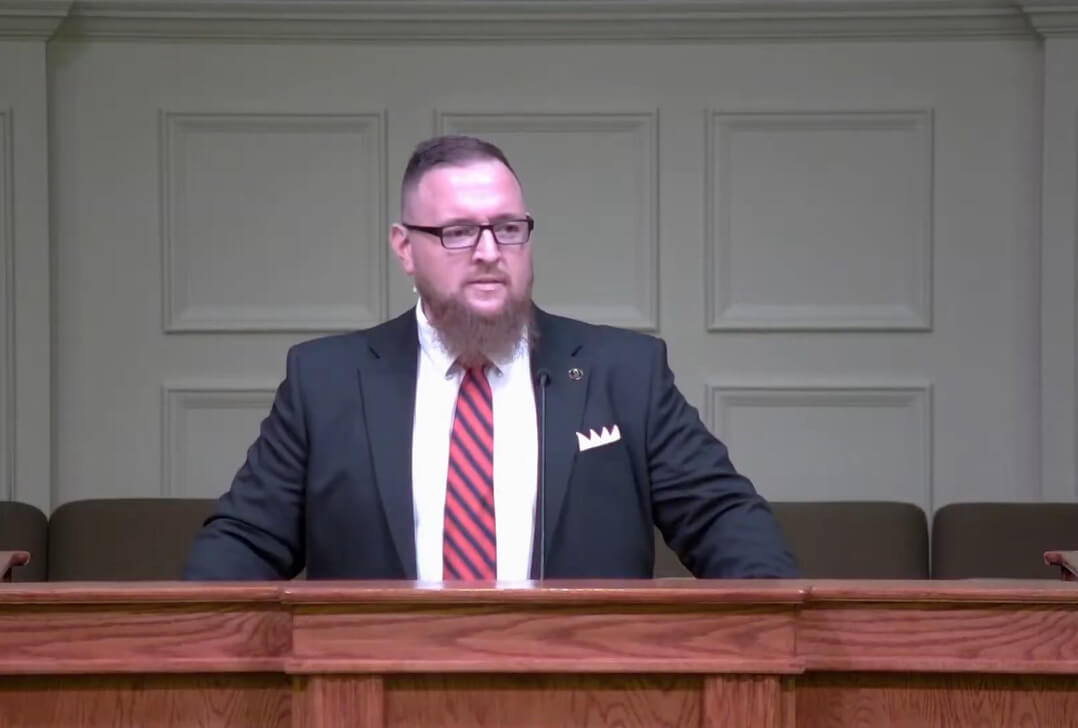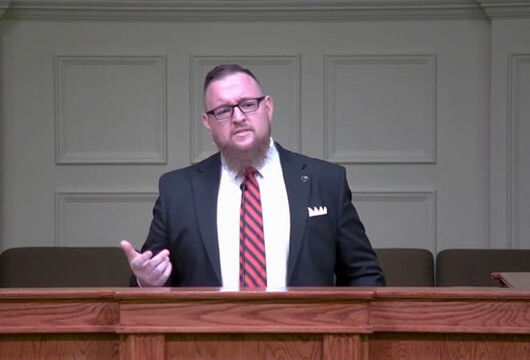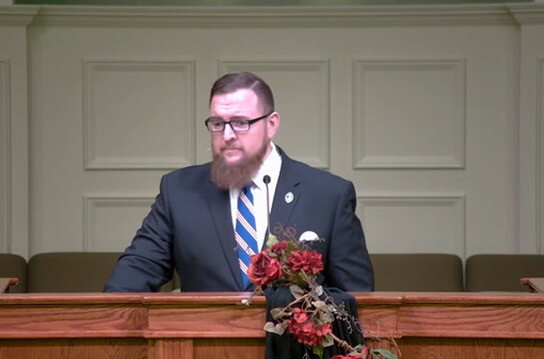Video
“He Knew All Men”
John 2:23-25
Pastor Ryan J. McKeen
04/06/2025
Audio
Transcript
Well, turn with me in your Bibles to John chapter 2.
John chapter 2, and we are in the final few verses of John chapter 2, verses 23 through 25. And we’ve been studying this one really event or episode in John’s account of the life of Christ for the last few weeks. It really began with the cleansing of the temple and then all the aftermath of that. A few weeks ago, we began with that, Jesus coming into the temple and his cleansing of that temple. He came to Jerusalem for the Passover. He comes into the temple and he sees chaos. Livestock everywhere, merchants. Out of zeal for his father’s house, he drives them all out. He makes a whip and drives the animals and the merchants and money changers out of the temple, cleansing it from all that was impure, all that did not belong there.
As you remember, just before this, these men, these disciples had begun following Him. It had not been long. Shortly after they began following him, they were at the wedding in Cana and he turned water into wine. They see that and verse 11 of chapter 2 says, Jesus did this in Cana of Galilee as the beginning of his signs. And he manifested his glory and his disciples believed in him. Because of what Jesus did, because of what they saw, their faith was made stronger, which was good. because their faith was about to be tested. And we saw that in the episode of Jesus cleansing the temple. They saw another side of this Jesus they were following. And when they see him drive out all the merchants and money changers, although this was an episode that could test their faith, that could test them to doubt, they didn’t. They remembered. They remembered what the word of God says.
And that’s what verse 17 of chapter two says. His disciples remembered that it was written, zeal for your house will consume me. It was God’s word that confirmed their faith. And then as we saw last week, immediately the Jews come running out to confront Jesus for what he did. What authority do you have to do these things? Show us a sign. So Jesus gave them a sign. And he said, destroy this sanctuary and in three days I will raise it up. And again, not surprisingly, the Jews totally missed what he said. They think he wants to destroy their precious building that they were so proud of. But John explained that what Jesus was really referring to in verse 19 was his own body. The body in which the Word became flesh. The body in which the fullness of God was pleased to dwell. You see, the Father and the Son, they enjoy this unique to them, mutual indwelling relationship. We see that in John 14, where Jesus is explaining to them exactly how his relationship with the Father is.
John 14, 10 and 11, do you not believe that I am in the Father and the Father is in me? The words that I say to you, I do not speak for myself, but the Father abiding in me does his works. Believe me that I am in the Father and the Father is in me. believe because of the works themselves. At very least, you can believe the miracles. But there should be more that cause you to believe. So it is the human body of Jesus that uniquely reveals who the Father is. And his body is really the focal point of the full manifestation of God. with man. He is the dwelling place of God on earth at this time. He’s the fulfillment of what the temple originally meant. And he is the center for all true worship. He speaks about worship in chapter four as we’ll come to that. But in this body of his, this temple, the ultimate sacrifice would take place. And within three days of his death and burial, Jesus Christ, the true temple, would rise from the dead. And that’s what Jesus is talking about here. But even John is the first to admit that neither he nor the other disciples fully understood what he meant. Because it wasn’t until Jesus was raised from the dead that they remembered. They remembered what he said. And they didn’t believe their eyes. They believed the scriptures.
Verse 22, it says, his disciples remembered that he said this and they believed the scripture and the word which Jesus had spoken. It wasn’t the miracle that made them believe. It was the word. They believed what he said. And they did believe because they heard what he said. They understood what he said, eventually. And when it happened, they believed it. And John continues here to focus on the disciples and their reaction to what Jesus is doing in their life. What he’s doing with the crowds and all those who are following. And John continually wants us to see how the disciples are taking this. How the disciples are affected by this. He wants us to see why he and the other disciples believed. And he wants us to believe too. And in our passage today, we see that there were many at this point who were believing. But what kind of belief was it? What kind of belief do we see in the many mentioned in this passage today?
This passage is really a transition from this episode of Cleansing the Temple to the secret meeting with Nicodemus, a ruler of the Jews, really one of the ones who had sent these different investigators to both John the Baptist and to Jesus to see what authority they have. And now one of these rulers himself is about to come to Jesus secretly. And we’ll see that in chapter three. And here in chapter two at the end, John is summarizing these events that have just taken place and he’s setting the stage for us for this conversation Jesus is about to have with Nicodemus. And this is an important passage because it gives us insight into those who were following Jesus and into Jesus himself. And those are really the two focal points of our text this morning.
We see number one, what we’ll focus on is the nature of saving faith. What is it to believe? And what type of belief is it that will save you? And then number two, the knowledge of the Savior. The knowledge of the Savior. I’m going to read our passage this morning, John 2, verses 23 through 25. This is the word of the Lord. Now, when he was in Jerusalem at the Passover, during the feast, many believed in his name when they saw the signs which he was doing. But Jesus, on his part, was not entrusting himself to them, for he knew all men. and because he had no need that anyone bear witness concerning man, for he himself knew what was in man.” Jesus remained in Jerusalem for the Passover, and then following the Passover is the Feast of Unleavened Bread. During that time, apparently, he had performed several signs and miracles. Because in our text, really the only sign that we’ve seen is the wedding at Cana, and that was a pretty relatively small crowd. It wasn’t all of these in Jerusalem. And yet John says, when he was in Jerusalem, many believed because of the signs he did.
So apparently he was performing many miracles and signs that we just don’t have recorded for us. But John told us that. John told us that in chapter 20. Verse 30, he says, therefore many other signs Jesus also did in the presence of the disciples which are not written in this book. Don’t think that the only signs Jesus did are the ones John mentions. There are many other things going on, but John has a purpose. He is driving us to his purpose of believing that Jesus is the Christ, the Son of God. He is selective in what he tells us, but because of these signs that Jesus was apparently doing, It says, many people believed in his name. But what does that mean? And what you have to do in understanding how it is that many believed in his name, and yet Jesus was not entrusting himself to them. Well, you look further down the road, farther along in Jesus’ ministry, and you see what the people were actually believing about him. You see in the other gospels, some thought that he might be a prophet.
Matthew 21 verse 11, the crowds were saying, this is the prophet, Jesus, from Nazareth in Galilee. He’s a prophet. Luke chapter 7 verse 16, fear gripped them all and they began glorifying God saying, a great prophet has arisen among us and God has visited his people. Both of those are true, but they’re not complete. He is a prophet, and God had visited His people, but He’s more than that. Others thought that their political conqueror had come. John chapter 6, verses 14 and 15. When the people saw the sign which he had done, they were saying, this is truly the prophet who is to come into the world. So Jesus, knowing that they were going to come and take him by force to make him king, withdrew again to the mountain by himself. And some people saw the signs that Jesus did as a means to a physical end. They wanted to get something from Jesus. John chapter six, a little farther down, verse 26, Jesus answered them and said, truly, truly, I say to you, you seek me not because you saw signs, but because you ate of the loaves and were filled. You’re just looking for an easy meal.
So yes, they were believing in his name for what? What were they believing in Him for? What kind of belief or faith was this? Was this a true saving faith? Well, I think from the reaction of Jesus, we must conclude that it was not. Because although many claim to believe, Mere belief in some facts or belief in what your eyes see is not necessarily saving belief. It’s not just agreeing with the right facts. Saving faith is more than that. Even the demons believe the right things.
James 2, verse 19, you believe that God is one. You do well. The demons also believe and shudder. So believing that there is a God, or that Jesus existed, or that he was a good man, or that he was a prophet, that’s not enough. That is not saving belief. Even though those things are true, believing in them is not what saves you. Jesus teaches this in the parable of the sow where the different types of belief there are. And as he tells about the seeds that fall on different types of soil. He speaks about the seed that falls on the rocky places in Matthew 13 verse 20. And he says, and the one whom seed was sown on the rocky places, this is the man who hears the word and immediately receives it with joy. They believe in his name.
But verse 21 continues, yet he has no root in himself. It’s only temporary. And when affliction or persecution arises because of the word, he immediately falls away. And then he talks about the one who the seed was sown among the thorns. And this is the one who hears the word and the worry of the world and the deceitfulness of wealth choke out the word and it becomes unfruitful. You see, there are different types of belief. And these examples, because their hearts are never truly changed. They fall away when trials come or when the world lures them away. And that’s what we see here with those who supposedly believe in his name here in John 2. And how do we know that? Again, because of Jesus’ reaction.
Verse 24, but Jesus. There were many who believed in his names because of the signs in which they saw. But, John likes to rain on our parade, doesn’t he? But, Jesus on his part was not entrusting himself to them. This word for entrusting, it’s the same word as the word believing in a different form. So you could say many were believing on his name, but he was not believing in them. John is using a play on words here. He didn’t have faith in their faith. He didn’t believe in their believing. Why? Because he knew all men. He knew that they were just believing in him for the signs. They were believing in Him because of what He could do or what they could get from Him. This was just a superficial faith. It looked like real faith and it sounded like real faith. They were following Him. There were crowds. But faith is not just words. We were in James 2 earlier.
Let’s go back to James 2. Turn there if you could. James chapter 2. James explains to us the problem of this type of superficial faith. James chapter 2, starting in verse 17. James says, even so, faith, if it has no works, is dead by itself. Then he goes on to explain what he means there. But someone will say, you have faith and I have works. Show me your faith without the works and I will show you my faith by my works. And there’s the verse we read earlier. You believe that God is one, you do well. The demons also believe in Shadrach. What James is doing there, he is confronting what these professing believers are confessing. You believe that God is one. That’s what the Jews confess. Hear, O Israel, the Lord our God, the Lord is one. Okay, yeah, you got that right. The demons believe that much.
So what you’re confessing is not evidence that you’re saved. That’s what John is saying. What you are confessing, what you say, the words that you’re using, that doesn’t mean that you’re saved. He continues, but are you willing to realize, you foolish fellow, that faith without works is useless? Faith that’s just words are useless. Was not Abraham, our father, justified by works when he offered up Isaac his son on the altar? You see that faith was working with his works. And as a result of the works, faith is perfected. The scripture was fulfilled which says, Abraham believed God and it was counted to him as righteousness. And he was called a friend of God. You see that man is justified by works and not by faith alone. And in the same way was not Rahab the harlot also justified by works when she received the messengers and sent them out by another way. For just as the body without the spirit is dead, so also faith. without works is dead. Faith without works is dead.
Now what it is not saying is that you are saved by your works. But what it is saying is that claiming to have faith, using the right words, or as James confronts, the right confession, you believe God is one. but never showing any evidence of that faith. That means that your faith is just words. James gives us two examples here. How do we know that Abraham believed God? Think back to that episode of Abraham and Isaac. God tells Isaac, go sacrifice your son that I promised you would have, and you’ve waited so long to have. Go take him up on the mountain and sacrifice him. How do we know that Abraham believed God? How do we know that Abraham had faith? Was it because he said, God, I believe you? No, it’s because of what he did. What he did showed what he believed. He actually sacrificed his son. And were not it for God stopping his hand, Isaac would be dead. But he had faith in God, and he did that because he had faith.
And Abraham did not have Any promise from God that said, sacrifice your son and then I’ll raise him up, or as long as you are going through with it, I’ll stop you in time, don’t worry. He didn’t have any of that. God said to Abraham, go do this. And he did it. No bargaining, no securities, nothing. just simply a command to follow. But Abraham had faith that God was good and that God was right in all that he said.
And then James takes us to Rahab. Rahab, who hid the spies when they came in to spy out Jericho. And then when they were coming to seek out these spies, she helped them escape. So how do we know that Rahab really had faith? Rahab was a harlot. Not necessarily a high reputation person. Not somebody who you would normally take their word for it. Do we know she had faith because she told the spies the right things? Because she told them that, yeah, I believe what you say. No, it’s what she did that we know that she had faith. Her faith was seen in what she did.
It’s interesting how God brings things along. On Friday night down to first Friday, we had a great time. We had several of you that were new to our first Friday that came out. We always encounter a lot of different types of people down there, and we had a lot of good interactions with both Christians and non-Christians and different things. But then we had these two guys that came up to us. They were from, I don’t even remember, some Baptist church from somewhere. It wasn’t around here. For some reason, they were down here. But what they were doing is they were going around to all the church booths and interrogating us on our doctrine. And I mean, I guess I appreciate their heart in that. They want to make sure that we are sharing the right things. And so they ask us, well, what do you believe that you need to believe to be saved? What is it that makes you saved?
So we answered, you believe in Christ alone as your salvation, that you trust in him as the payment for your sin. Oh yeah, that’s great, that’s great. several other questions along those lines to make sure we believe the right things. And they said, well, what about works? Do you think works are any part of your salvation? And Kieron rightly said, Kieron was down there with us, he said, well, no, some people believe that you do your works and then you become saved, but the reality is you become saved so that you can do good works. And they said, well, wait a minute, you’re not saying that You have to show good works after you’re saved, are you? And I’m like, well, we believe what the Bible says, that yes, there will be evidence that you are saved, that your life will show the fruit of being saved. And they did not really agree with that, so they moved on eventually.
But this is exactly what we’re talking about. that it’s not just that you confessed at one point the right words and you repeated after me the right things that makes you saved. It’s true belief, true faith and trust and how do we know that that’s there? Is it because you said the right things? Because you can repeat after me the right things? No. It’s because the life you live shows it. Matthew 24, when Jesus is telling about how he will divide the sheep from the goats, how does he determine the sheep from the goats? The goats are the ones who are saying, Lord, Lord. They’re confessing the right thing. He is Lord. How does Jesus divide them? By the way that they lived, by the way that they showed their faith. They showed they had real faith.
Let me give you an illustration from the master illustrator, Charles Spurgeon. And his illustration just captures this so well. What it is that defines what true faith, true saving faith is. This is his illustration. He says, your condition is like that of a child in a burning house, who having escaped to the edge of the window, hung on by the windowsill. The flames were pouring out of the window underneath and the poor lad would soon be burned or fall and be dashed to pieces. He therefore held on with the clutch of death. And he did not dare to relax his grasp until a strong man stood underneath him. And he said, boy, drop, drop, I’ll catch you.
Now, it was no saving faith for the boy to believe that the man was strong. That was a good help towards faith, but he might have known that and yet have perished. It was faith when the boy let go and dropped into his big friend’s arms. There you are, sinner. clinging to your sins or to your good works. The Savior cries, drop into my arms. It is not doing, it is leaving off doing. It is not working, it is trusting in that work which Jesus has already done. Trust, that is the word. Simple, solid, hardy, earnest trust. Trust and it will not take an hour to save you. The moment you trust, you are saved.
That is saving faith. Not just seeing that he is a worthy savior that is capable of saving, it’s trusting that he has saved me. Trusting that he has taken the punishment for my sins and that I do not need to earn God’s favor. Because he already has. Was the boy saved because he believed that the man was strong? Was he saved because he said, I believe you are strong? No, he was saved when he let go. And he gave evidence that he did believe that the man could save him. And when Jesus sees these many believing in his name because of the signs, They’re looking at the signs, they’re not looking to Him. He knows at this point that their belief is just words.
Now were there some there that would come to true saving faith and trust Him? Yeah, probably there were some there. But He knew all men. And He knew what was in them. And at this point, He was not entrusting Himself to them. because he knew something about them that they probably didn’t even know about themselves. We see here the first focus of this text is the nature of saving faith. Saving faith is a real trust in Christ as your savior. It’s not just knowledge about the facts about Christ. It’s not saying you believe or repeating any words, and it’s not seeing him do miracles. and believing that he can do miracles. It’s not believing he’s a prophet or a good teacher or a miracle worker. Those are just the signs that point to who he is.
Do you believe and trust in who he is? True saving faith is seen in our life. When we do trust in who he is, It will make a difference. It changes our hearts. It changes who we are. We will obey. Jesus says in John 14, verse 15, if you love me, you ought to keep my commandments. You should keep my commandments. You might want to keep my commandments. No. If you love me, you will. Keep my commandments. You will, if you truly love Christ. If you truly trust Him as your Savior, this will be seen in your obedience to Him, and that’s our assurance. Seeing the difference that He’s made in my life, that’s how I know. It’s not because I can say the right words. A lot of people can say those words. Does it matter to you? Does it make a difference in your heart?
That’s saving faith. Which leads us to the second part of our text this morning, the knowledge of the Savior. The knowledge of the Savior. And this is where John is honing in on his purpose for this book. He says, starting in verse 24, but Jesus, on his part, was not entrusting himself to them, for he knew all men. And because he had no need that anyone bear witness concerning man, for he himself knew what was in man. He knew. He knew all men. Now the question here that gets to John’s purpose is how did he know? How did he know? How did he know what was in man? There’s a few options that you could answer this question with. Number one, you could say that he knew what was in man because he was a man. And he had experiential knowledge of manhood, and he knew what wicked and sinful men are like. Yes, Jesus was a true man. But that cannot be why he knew. He was truly human, but he did not inherit a sinful nature. He didn’t know what was in man because it was in him.
2 Corinthians 5:21, he made him who knew no sin to be sin for us so that we might become the righteousness of God. First Peter 2:22, Christ who did no sin nor was any deceit found in his mouth. First John 3.5, and you know he was manifested in order to take away sins and in him there is no sin. And then Hebrews 4. Verse 15, we don’t have a high priest who cannot sympathize with our weakness, but one who has been tempted in all things like we are, yet without sin. Yes, he’s been tempted like we are, but not because he has a sin nature. Not temptations from within himself. He was truly tempted.
So this isn’t like when you see a child who is struggling with obedience or sharing or struggling with their anger and you say, yeah, I know what that’s like. I was just like that. That’s not what Jesus is like. Yes, you know what’s in your child because that’s in you. But that’s not how Jesus knew what was in man. It wasn’t because it was in him too. He didn’t have sin, so that couldn’t be the source of this knowledge. He didn’t experience the sinful human nature.
But another option is, he knew it was in man because he was spirit-filled. And there are some who hold this position. They would say that Jesus knew things like a prophet knew them. that God the Father through the Spirit would tell Jesus things like he often spoke to the prophets. And then when he became a man, Jesus gave up his divine prerogatives and no longer had access to his knowledge as God. But that only makes sense if a man is all that he was. And that might be justifiable if the passage stopped at verse 24. But verse 25 says, he had no need that anyone bear witness concerning man, for he himself knew what was in man.
John is clarifying this for us. Nobody had to tell Jesus, not even the Holy Spirit. No one had to bear witness. One of the jobs of the Holy Spirit is to bear witness to man. John says Jesus didn’t need anyone to bear witness to him about what was in man. Nobody needed to tell him. He knew himself. He didn’t need to be told like a prophet because he already knew. And we do have verses in scripture that show at times Jesus veiled his That he restricted himself to the limits of humanity and there are times where Jesus is limited in his knowledge. Like when he doesn’t know the day or the hour of his return.
But there are also times when we see Jesus display things that show us he is God. There are times where he knows things that only God can know. and both work together. And that sounds confusing. It sounds like both can’t be true at the same time, but that’s the mystery of the incarnation. He is God, and he is man. He is fully unlimited in all things because he’s God, and he is limited because he’s man. Which brings us to our third option to answer how is it that he knew what was in man? And this, I believe, is the correct option because of what the scriptures say. He knew what was in man because he is God. Jesus knows more than a prophet knows. A prophet knows what he’s told. Jesus is more than a prophet. Jesus knows things a prophet cannot know, and we’ve already seen this on display in the calling of Nathanael.
Nathanael comes to Jesus, and Jesus says, behold, truly an Israelite in whom there is no deceit. He knew him. He knew his heart. Nathanael says, well, how do you know me? From where do you know me? Have we met before? Jesus says, before Philip called you, when you were under the fig tree, I saw you. Nathaniel says, Rabbi, you are the Son of God, the King of Israel. Nathaniel believed he was God because he knew only things God could know. In other places, Jesus shows his divine knowledge. And even with that interaction with Nathanael, you never see a prophet do that. Reveal some knowledge and the person responding says, now I know you’re God. This is evidence that Jesus is God.
In Luke chapter 5. Verses 21 and 22, the scribes and the Pharisees began to reason, saying, who is this who speaks blasphemies? Who can forgive sins but God alone? But Jesus, knowing their reasonings, answered and said to them, why are you reasoning in your heart? He knew what was in their heart. He knows their hearts like only God knows. And then in connection with our passage today, that Jesus knows himself what was in man. Like John often does, he keeps that nugget and he further explains it later on. Because in John chapter six, verse 64, John says this, the words of Jesus, but there are some of you who do not believe. For Jesus knew from the beginning who they were who did not believe and who it was that would betray him. He knew their hearts. He knew from the beginning.
This is why John says in verse 25 of chapter two, he had no need for anyone to bear witness concerning man. Because he himself knew. He knew from the beginning. He wasn’t told. He knew. Jesus had knowledge that only God could have. He knew their hearts. And what is it that he knows about their hearts? What is it that he knows about them that he refuses to entrust himself to them? What does he know about their hearts? What do we know about our own hearts because of what the scripture says? Jeremiah 17, that our hearts are desperately wicked. Jeremiah 17, 9, the heart is more deceitful than all else and is desperately sick. Who can know it? Who can know the depths of the depravity of the human heart? Apparently Jesus can. Jesus can. Jesus does. He himself knew what was in man’s heart. And this is a revelation of his knowledge that proves something to us. It tells us what John has been trying to tell us all along. He is the Christ, the Son of God. He is God.
Because back to Jeremiah 17, that’s verse 9 is the one we memorize and we know. The heart is more deceitful than all else and desperately sick. Who can know it? Who is it, Jeremiah tells us, that knows it? Verse 10, I, Yahweh, search the heart. I test the inmost being. Who knows it? God does. Yahweh, God. He knows the heart. He searches the heart. He tests the inmost being. So if Jesus himself knows what is in man, what does that mean? It means that Jesus is Yahweh. He is God. And this is what John is telling us in this gospel. This is what all the signs point to, and this is another sign pointing us to who he is. This is what the disciples saw and believed. And later on, when they keep seeing sign after sign after sign, it starts to click with them.
John 16, Peter, in verse 30 says, now we know that you know all things and have no need for anyone to question you. By this, we believe you came from God. You know all things and therefore, You are the Christ, the Son of God. His knowledge is evidence of who He is. The disciples saw and heard and believed, and the more and more this evidence builds up, the more and more their belief is strengthened. And we see here that John has provided evidence, and that evidence is the knowledge of the Savior.
We also see that it takes more than superficial belief to be saved. Jesus saw that they followed him. He saw that they believed on his name. He saw that they liked the signs that he did. But he also saw their hearts. And he knew their hearts because he’s God. He knew that they didn’t really trust Him as Savior yet. So the question is, do you? Jesus knows your heart too. Do you trust Him? Does your life give evidence that you truly believe? If you love me, you will keep my commandments. So do you? We don’t keep them perfectly. We are still in this body of sin. But do you strive? Do you want to live your life in obedience? Can you look at your life and see the change that He has worked in you? That is saving faith.
If you do not yet trust Christ as your Savior, you need to come to Him today. You need to believe in who He is. You need to believe that He is God in the flesh, that He really lived as a true man, and that He really died on the cross. You need to believe that He rose again and that He is seated at the right hand of the Father, and you need to believe that He’s coming again one day. And those are all the facts you need to believe. because they’re true. But you also need to trust him. Don’t just look at the Savior and see a Savior that’s worthy to save. Trust that he saves you. You need to trust that he alone is your salvation. You need to stop trying to earn your way to God. Nothing you could ever do could pay for your sin. You need to let go of your own self-righteousness and trust that He alone is your Savior. That is true saving faith.
And if you do know Him, do you keep His commandments? Do you live like you believe? Let’s make it our aim to show our faith, not just by our words. but by the way that we live.
Let’s stand and close in a word of prayer. Our God in heaven, we are humbled by a passage that shows us so much about our Savior. Lord, we know that you see our hearts. We know that you know in yourself what is in us. And Lord, we are humbled because of what you tell us is in us. I pray that if there is anyone here this morning that has not trusted you alone for their salvation, Lord, melt their hearts. Soften their hard hearts and bring them to yourself. Help them to not just see Christ as a worthy savior, but to trust him as the one who saved them. Lord, we thank you for such a great salvation. We pray that you are glorified in the way that we live for you. And we pray this in Christ’s precious name, amen.
